‘We were lying in the open air, shells were whistling overhead.’ A resident of Mariupol tells about the evacuation and the situation in the city
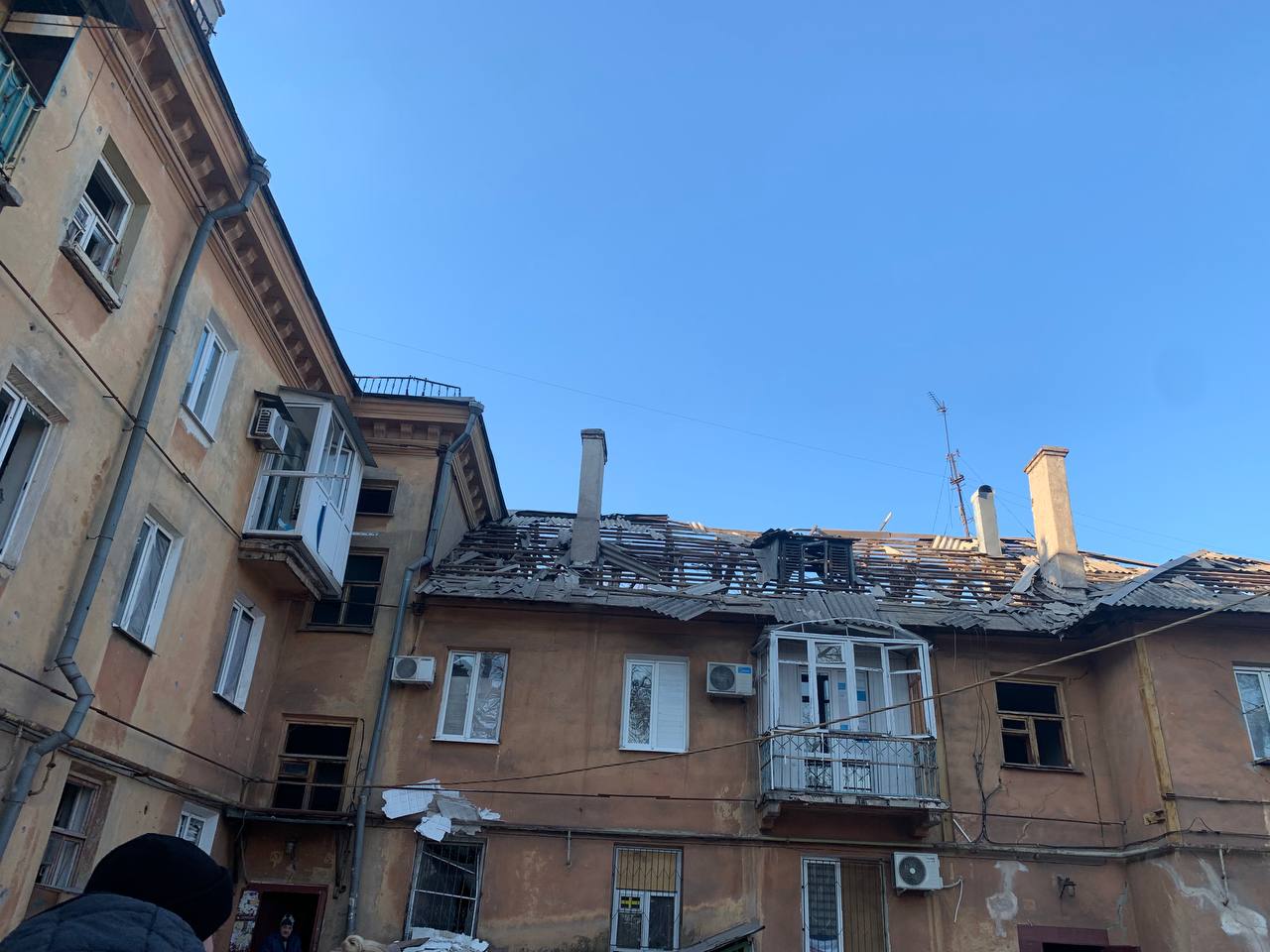
38 days spent in the basement to survive the blockade, search for products and cooking at a bonfireunder the sound of explosions, mass graves and building the routeto salvation. It was all reported by Nikol, a resident of Mariupol, who with her sister and nephewwas able to use a humanitarian corridorand leave the “hot spot”.
“Nobody could even imagine then that their favorite city would turn into hell”
— On February 24 the life of many Ukrainians changed. Tell me,what was your reaction when you learned about the full-scale invasion of RF?
— I was not sleeping when there was the address by the President of RF, therefore I learned about it from the news. One moment the sky before my eyes became bright orange, after that there was a loud explosion. As I learned, in the morning a missile hit the school not far from our home. I remember that I was scared and the tears appeared in my eyes. Then I realized that something terrible awaits us. But I could not imagine how terrible.
— What was the situation in Mariupol in the first days?
— There was aimed shelling for the first four days, which does not surprise Mariupol after 2014. Other cities underwent greater attacks. When my friends from other corners of Ukraine texted me: “How is the situation in Mariupol?”, odd thing, I answered that the situation was normal.
I also tried to help the villages in suburbs that suffered the shelling, was able to visit a store, where I could already feel the lack of products because the people bought them en masse. I was incredibly happy when I was able to buy four loaves of bread. On March 1 there was the full-scale invasion that is not finished yet.
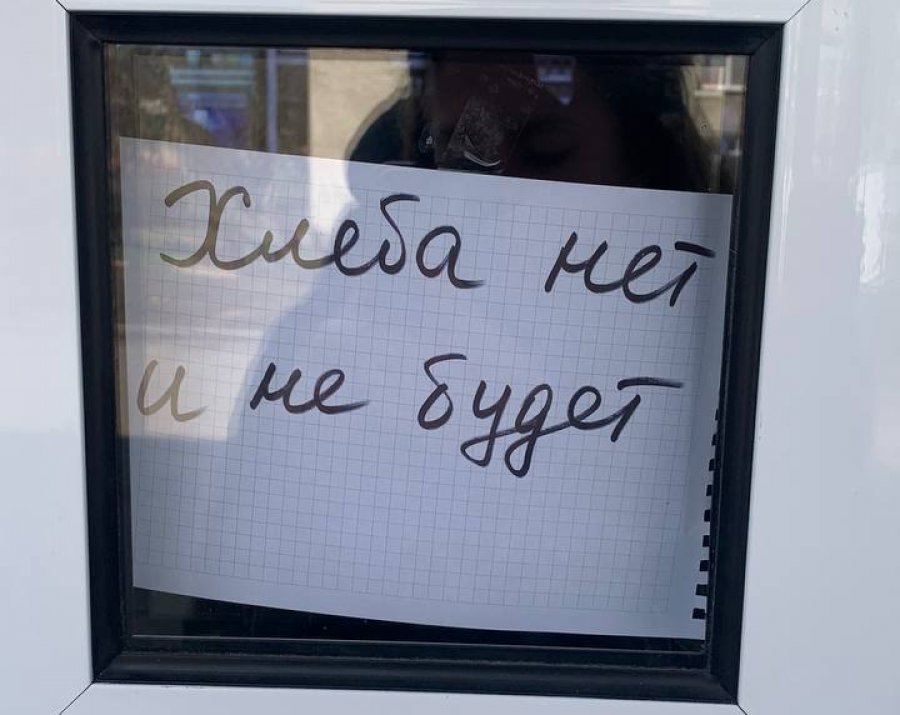
— Why did you decide to remain in the city instead of leaving in the first days?
— Mariupol was already suffering from the attacks of the occupiers, So it did not scare us too much in the first days. Although I was worried by the fact that many acquaintances tried to leave the city. But nobody could even imaginethat it would turn into a blockadeand our favorite city would turn into hell.
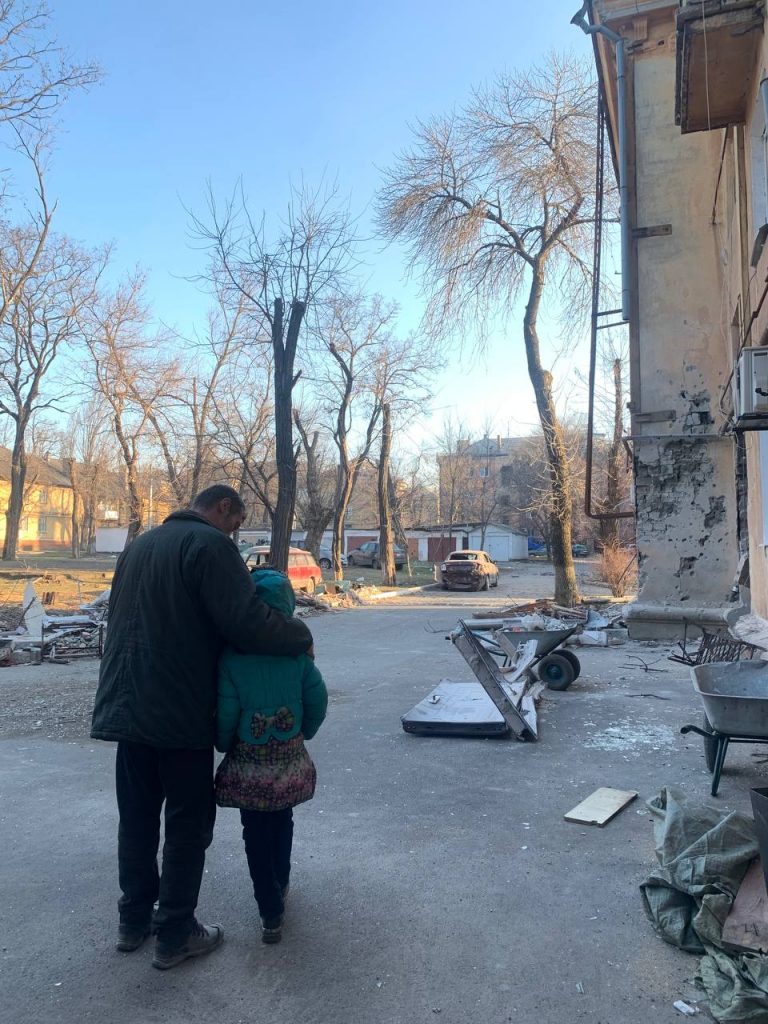
— You said that volunteer groups were formed at first. Tell us in more detail about it.
— The shelling forced people to hide in bomb shelters. Due to a certain deficit of products in the stores and the curfewthere was no opportunity to obtain the necessary food products, so the volunteer groups of Red Cross were formed, as well as the ones formed by the town council. I joined the Ukrainian Volunteer Service, where I wanted to make a personal contributionfor the support of the citizens. I tried to help the agricultural base near Mariupol, where the people have spent three days without bread and water. Luckily, that problem was solved.
“I am sorry but I want to eat and live”.
— How did you obtain the products and cooked when the blockade began
— At first we used our own supplies of food and water. In time we began to visit the sister’s flat that contained the products, despite the danger. The city was constantly shelled, So we tried to take as much as possible in one visit.
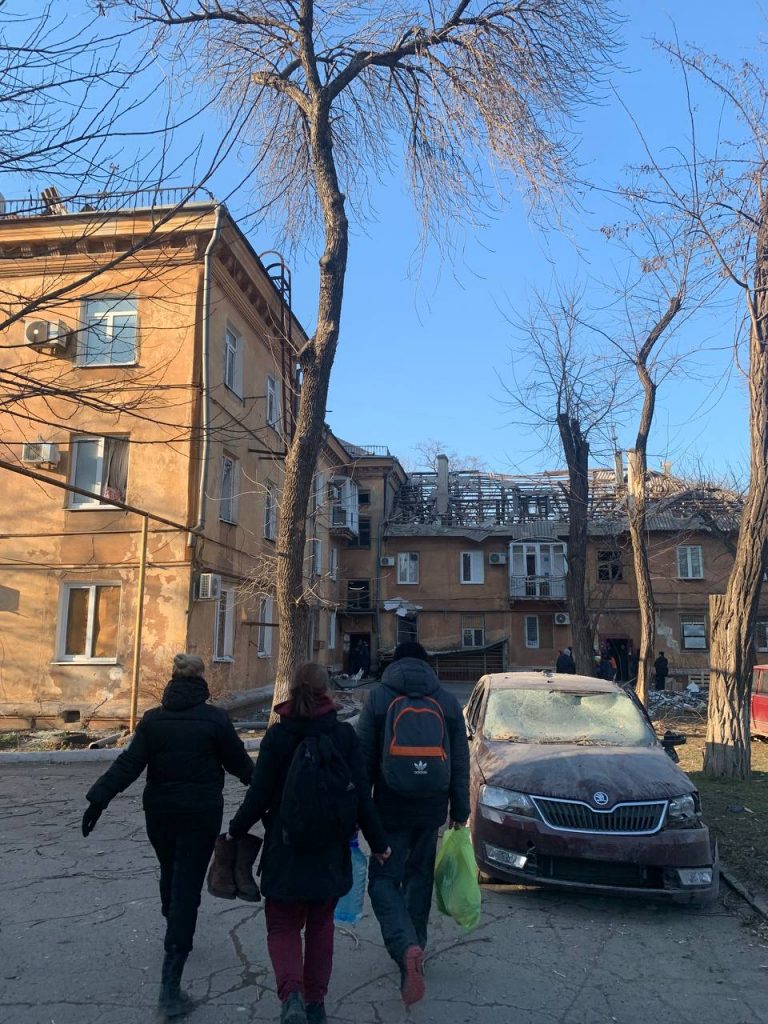
Many people were saved from starvationbecause they were obtaining food from the broken stores. Someone even wrote on one of the stores: “I’m sorry, but I want to eat and live”.
We were treating our neighbor, she treated us. We also exchanged food. For example, we were able to obtain fish for buckwheat porridge. In addition, a neighbor visited the abandoned houses with words: “I’m sorry, I only need food”, he took for his family and brought to us. We cooked everything at a bonfire, although it was dangerous, because the planes flew around constantly, dropping bombs. Also, the fragments of shells flew around sometimes, we had to duck.
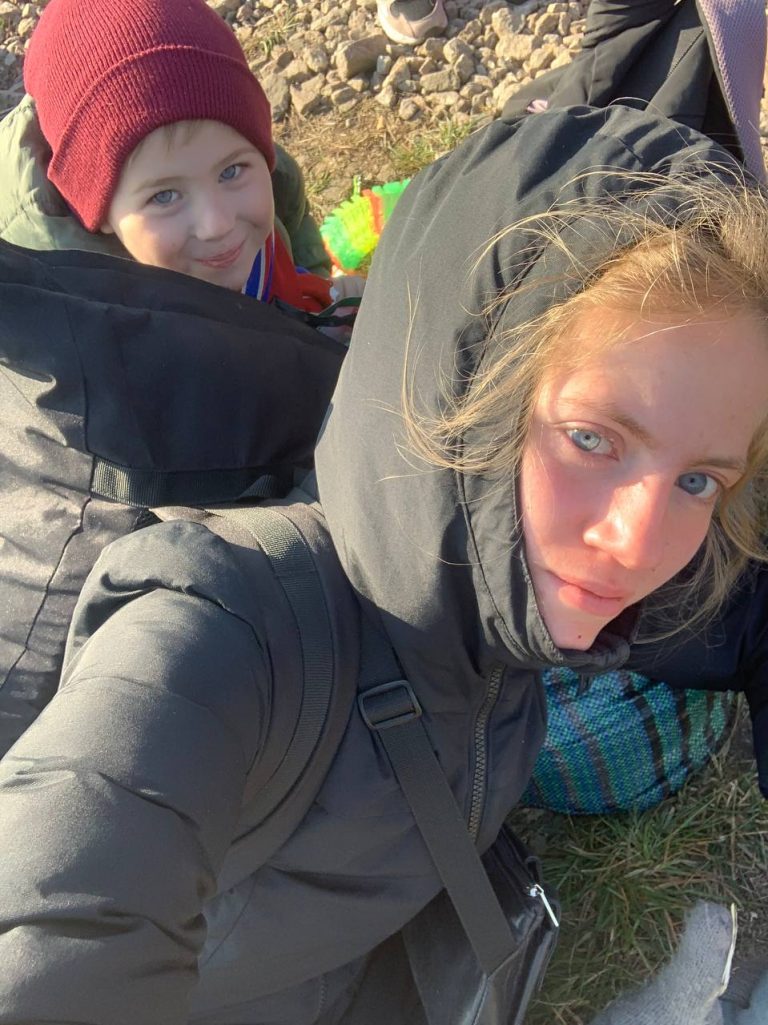
We risked and went to get water once. One kind person had sun batteries on the roof, a well from which he pumped water and distributed it to all who needed it. We got in line at half past sixand returned at half past three in the evening. My grandma did not know there would be such a line, She began to worry and went in search for us. We met her in the alley, where she was already crying because she thought we were dead.
— You weren’t moving the city much, but you saw what happened to the nearest buildings after the air raids. Tell me about it.
— On March 2 the neighboring building burned down, and another one on March 5. A shell fell between our house and the neighbor’s, The ceiling fell on me and my 4-year-old nephew because of that.
My neighbor was home when it happened. We ran to check if she was fine, she shouted “I’m alive!”, that’s what matters the most. She had to live through the window because the door was damaged.
The glass disappeared from our windows on the first day of March, so we patched them. We did it many times because it was all falling apart due to constant shelling.
There wasn’t a single house near us that was not damaged.With each day the number of ruined household increased.
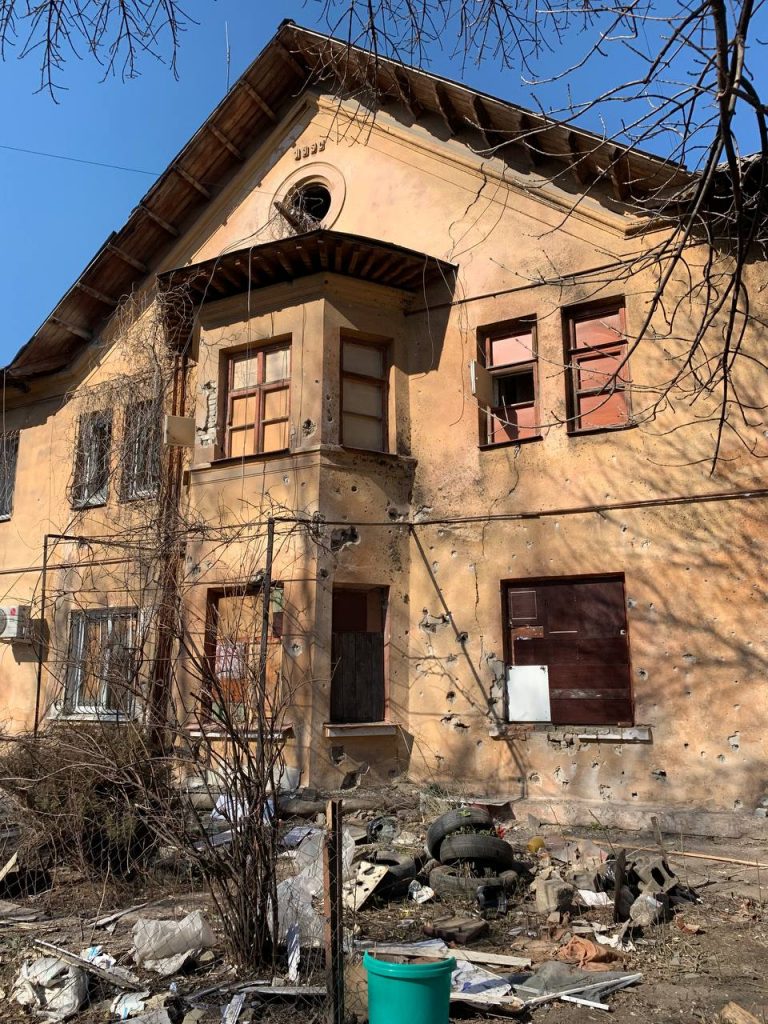
When almost everybody left their households the occupiers began entering them like their own homes, they left the doors open after they left. They began living in the homes, placed their vehicles nearby, which was scary, because they risked calling for a return fire.
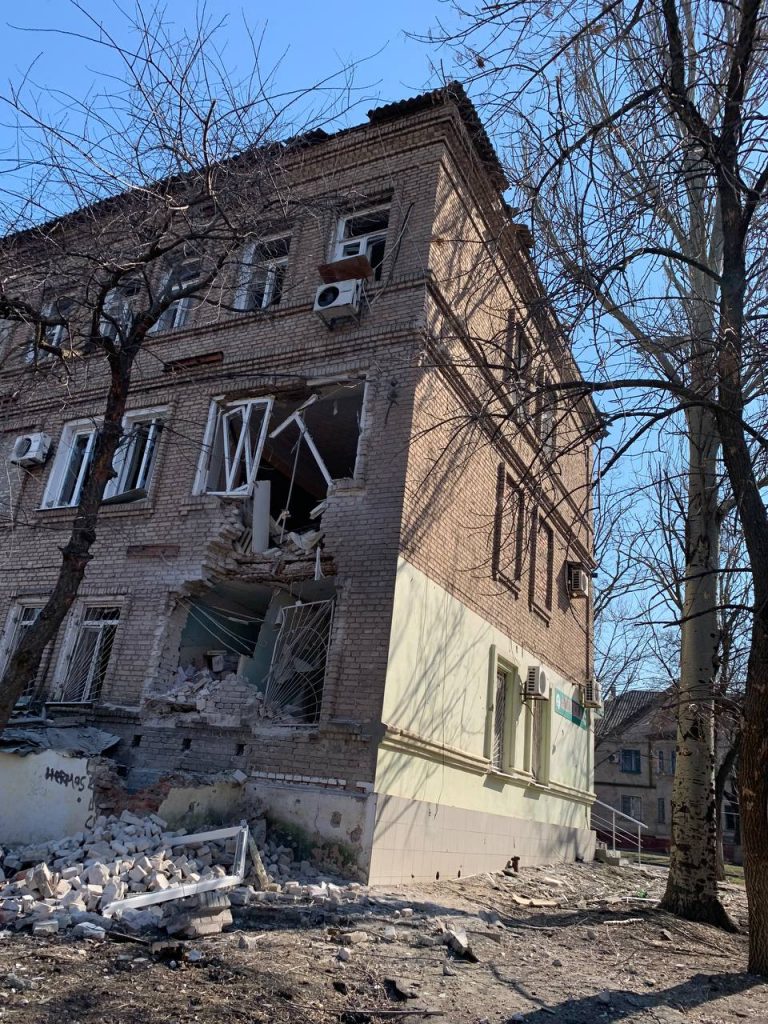
— You’ve told about the case when the ceiling fell on your nephew and yourself. Can you provide more detail?
— We were sitting in the room, the two of us. All others were in the summer kitchen. My nephew and I were discussing his days in the kindergarten. Suddenly I heard that a shell fell very close by. We were used to it and could tell by the sound, when it falls nearby or far away. That time I realized we had to hide, but I did not even have the time to think about it, when the second shell fell near my house. A gust of wind due to the blast wave and shards of glass flew into my room. On the very moment the ceiling fell on us. I was able to cover my nephew with my body. A rock fell on my hip. Luckily, we weren’t seriously injured. My relatives at once ran in asking: “Where are you?”and we went to the basement.

— Have many neighbors remained in Mariupol?
— There are few neighbors left. Some were forced to travel to the temporarily occupied territories because there was no other evacuation on the left bank. We lived far from the city, from where we could get to Zaporizhzhia. Some did it to save lives, some were forced to lose their homes. Others were intimidated by the rumors launched by the occupiers. They said that allegedly the fighters from “Azov” change into civilian clothesand hide in the buildings, so the occupiers will go and throw grenades in the basements without previous questions. It did not happen, bu t there was the moral pressure for the people to go to the temporarily occupied territories. There were also rumors about the so-called “purge”, when they would shoot all residents in order to “liberate the city. The neighbors who remained lived as usual. Burning fires and hiding in basements.
— The Internet and communication disappeared in Mariupol in the first days of March. How did you find out the latest news?
— When the communication disappeared we could not obtain any news except the information told by the neighbor. However, he was not a reliable source of information, so we got an old tape recorder that worked both from the network and from batteries. But we needed 10 of them, so we gathered them from all sources: three batteries were given by a neighbor, three more by another one, and we had four more. We were listening to radio marathon on AM waveonce or twice a day to hear the news.
Due to severe frosts, the batteries drained quickly, leaving us without communication for several days. We decided to go to the house that the neighbors had left recently when it was on fire. We knew they were listening to the news, so we had some hope that the radio could stay there. We were lucky to find it, it worked on two AA batteries, so we could listen to the radio more often. We were especially happy to hear the news about Mariupol, because we did not know anything about our hometown. We told the news to a neighbor, one day she came to listen to them with us.
“When you want to survive, the last thing you can do is be afraid”
— You have already told about certain methods of intimidationand psychological manipulation used by the Russians. Maybe, they tried to exert influence in some other way?
— I’ve already told about some of them, but there were some other psychological manipulation. One day a neighbor met us with good news — the connection appeared! We turned our phones on at once, but were not able to phone or text. We were only able to receive two messages from number 777 with the following contents: “The people who leave the city voluntarily will survive”and “Slavic brothers! We, Chechens, arrived to liberate you from Nazis”. The communication went down at once after that. Also, after a month of city-wide silence, except the constant explosions, the music started sounding. Those were the songs that sounded in “Veselka” park. We heard “What the motherland begins with”, “Smuglyanka” and others. They did not sound long, probably, because our soldiers did not like them. For me and my family, it was also blasphemy against the war-weary Mariupol residents.
— How did you fight the pro-Russian propaganda?
— I am immune to pro-Russian propaganda. I didn't give in to it, but it annoyed me. I could not express my indignation because it was dangerous. We whispered so that no one would suddenly hear. Because it could cause the bombing of our house.
— Were you scared?
— Fear did not overcome me, because there was no time for it. When you want to survive, the last thing you can do is be afraid. At times when there were very loud explosions and the house “jumped” and the neighboring houses were on fire, of course, it was scary that the next one could be ours, but we prayed. We constantly prayed while kneeling, hiding our heads. We did not plan to despair. Even when my family panicked, I reassured them and said that everything would be fine.
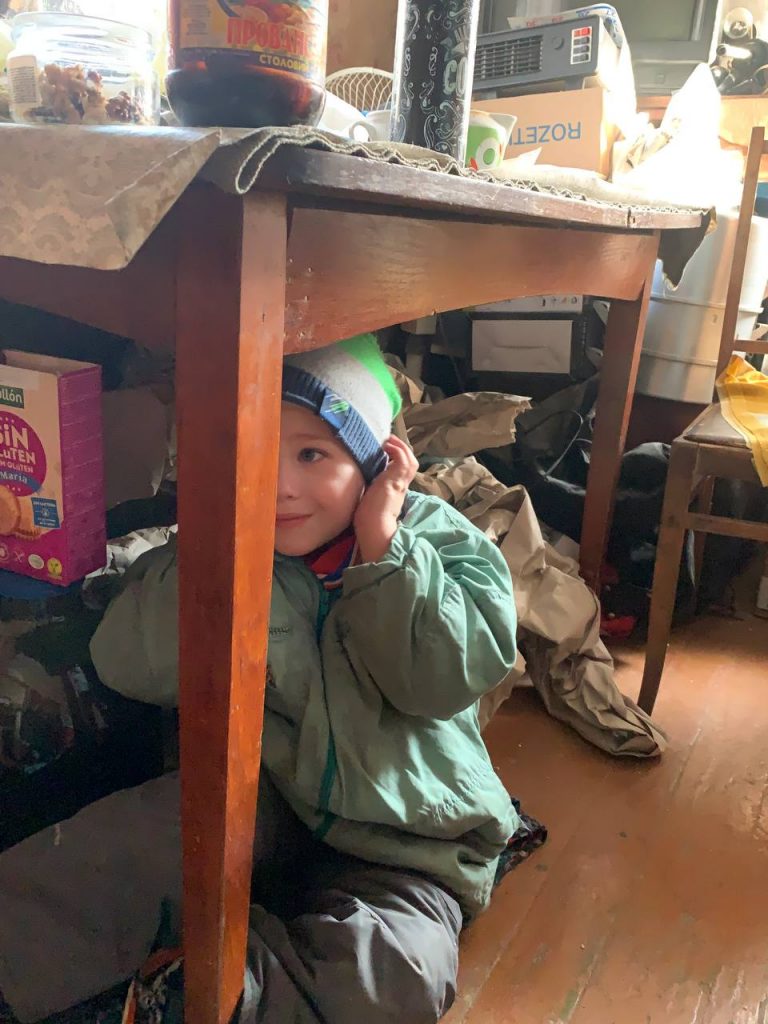
— What was the scariest in the conduct of the occupiers?
— We were not afraid, as I said, but we did not dare to go to my mother, because where she lived, there were Chechens, and they courted the girls. So we decided not to take risks.
Probably, the scariest thing was the conduct of one of the occupiers near Vasylivka, when we were moving to Zaporizhzhia in the evacuation buses. He took a rifle, aimed at our buses and was slowly aiming at the entire convoy. Then he got up, waved at us and sent us an air kiss. It is also a mockery which I cannot understand. To mock the exhausted Ukrainians in such situation, who are forced to flee their homes, it is unacceptable. But they are inhumans, it is natural for them.
— You told us that there were many civilian casualties in the city. How terrible is the situation?
— Many mass graves dug by the relatives and friends for the deceased. My relative was cooking food with four neighbors at a bonfirenear the entrance to his house. He went to another entranced to speak with his acquaintanceand it saved his life. A shell fell near them and all four of them died. He buried them personally and could not regain his wits for several days.
There are many such mass graves. Burial places near each residential high-rise. Crosses one after another. This is not actually bad, because a lot of people are still not buried. They just lie on the ground. There are a lot of them, it's scary to see. One day four people were lying near the well where my relative went for water. There were seven near the completely burned-out cafe. We weren’t moving the city much, so we did not see it with our own eyes. But our relatives saw it. One woman went to visit her son across half a districtand saw 5-7 dead in each yard. Although it was impossible not to see them at all. On the way to freedom from the city we saw three dead civilians.
— What became the turning point, when you decided to evacuate?
— When the shelling became particularly strong, our grandma began thinking about the ways to evacuate. For the first time we have touched this topic so seriously. After that we went to speak to our mom who was elsewhere. We were warned that it is hard to return from that district, because there was a chance that the occupiers would not let us out. We were also worried because there were many Chechens there.
The way that we used to go to the flat to get food was too difficult the last time. The building we had to pass by was burning, so we decided to go through other yards (few dare to go through open central streets, because there is nowhere to hide thereand one could catch a bullet), but we met many occupiers there. We felt chills in our hearts and immediately turned back. Luckily, nobody stopped us or asked anything.
Then an occupier looked at us with binoculars. When we got to the bomb shelter, where we were visiting our relatives, and met acquaintances. They offered to guide us, but we decided to go alone, because two women with a child are more likely to go out than men who will attract too much attention from the occupiers. The next day we packed up and wanted to go, but there was a massive shelling, so we had to postpone it for two days..
On March 31 we heard on the radio about the arranged evacuation buses from Mariupol to Zaporizhzhia and decided that it was our chance. On April 1 we moved.
The way to safety: “We did not have anything except our faith”
— How did you manage to leave the district and reach the Red Cross?
— We drew a map, how to leave the left shore. We moved at half past seven in the morning. There were civilians on the way who cooked food. We decided to tell everybody that we were going to the hospital with the child, so that the occupiers would let us through. We were told that the hospital was ruined and we had to wear white bands on our arms. It is believed, but this idea was imposed by the occupiers, because they bind a white handkerchief around an arm or a leg, while Ukrainian military do not mark themselves with white. We took it into account and moved along.
On the way to the hospital we met two occupierswho asked where we were goingand after hearing the answer said “Ok, you may go”. One of them advised us to go another way. When we got to the hospital, we saw that it was intact, so the information from the people was false. We moved along and were shelled. We were lying in open air, there was nowhere to hide, and the shells were whistling overhead, falling several meters away, the mud was falling on us.
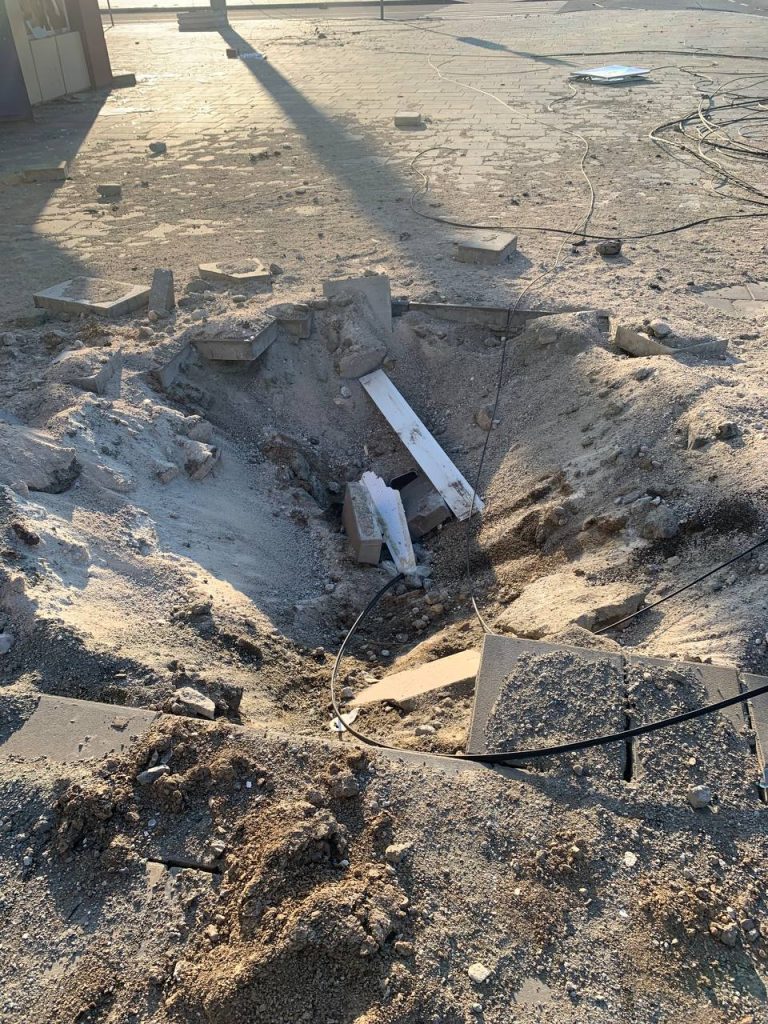
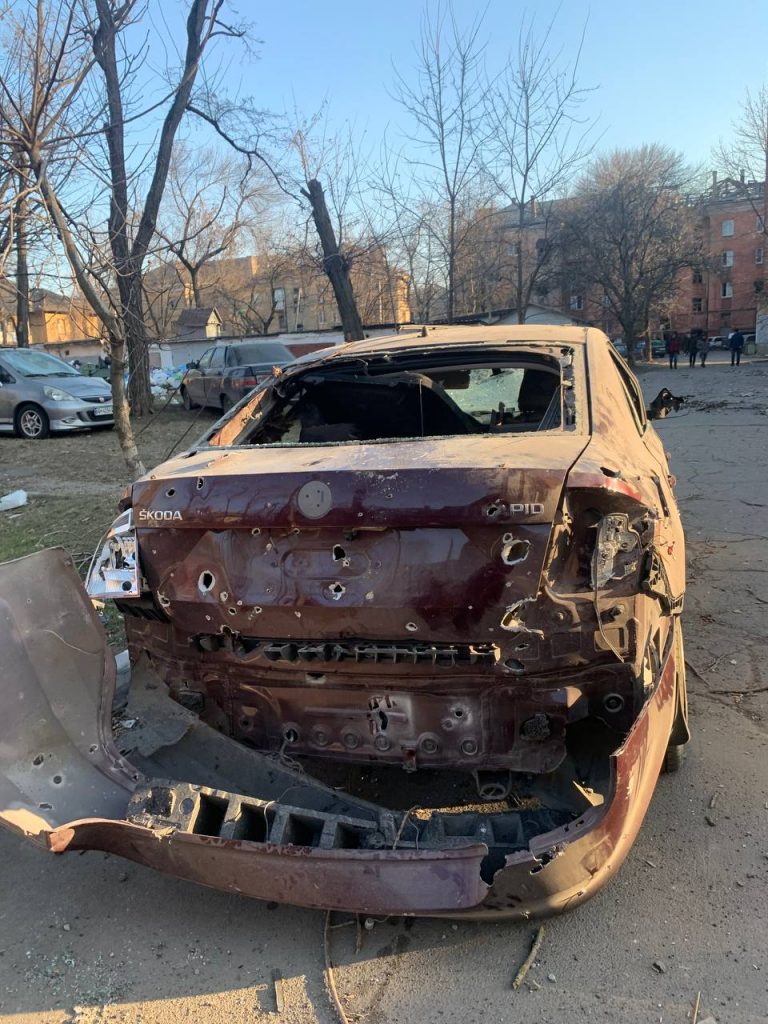
When we were lying down we were constantly praying. We did not have anything except our faith. It was scary to continue moving, but ahead of us there was at least a small fence, behind which we could hide from possible shell fragments. The shelling lasted the entire way, so we got up, made two steps, then dropped down again. Then again got up, made two steps and dropped down.
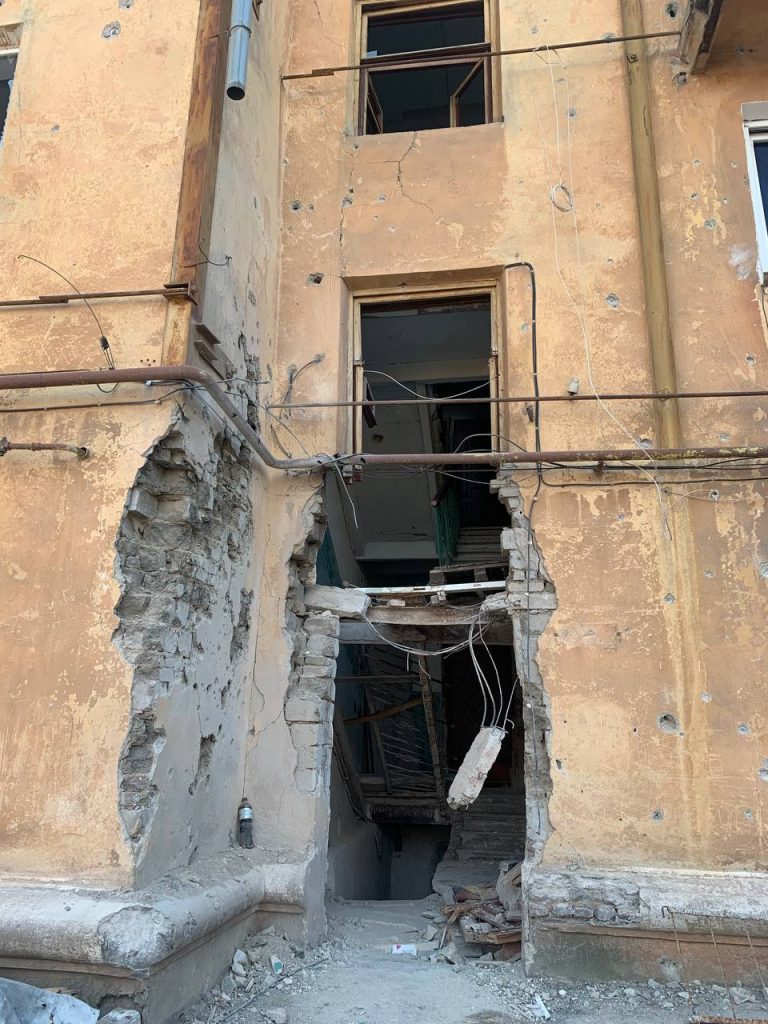
I was worried for my nephew, because he is only 4 years old. While I was scared, he could end up with mental trauma. I saw a ladybug in t”. There was a smile on his face, it calmed me down.
It became safer when we reached the lowlands. We had to climb over barbed wire, which cost us an hour. Fortunately, we were helped by a man who was walking next to us. Thanks to him we got out. He was a pastor and started praying for us, then we couldn't hold back our tears. And we wept, for it was the true miracle of the Lord that he met us. We learned from him that the bridge we had decided to take had been blown up. He gave up his path and went with us to the place where he returned from.
We were going past the “Azovstal” plant, which was targeted by the Russian aviation. It was an endless path, but we overcame it. There, where the central entrance was, there is a pile of bricks now. I saw two dead civilians under the rubble and had to distract the child, to prevent him from seeing it. When we finally got to the right shore, where it was relatively safeand we were able to walk without ducking, a sniper waved at us from a window, who was observing us while we walked. The pastor brought us to the Gospel Church, where we were warmly welcomed, fed, and left for the night. The next morning we went on. Sergei Bovarovich suggested a safe path. Finally we reached the end of the city, from where we could get to Zaporizhzhia.
— How dangerous was the path to the evacuation convoy in Berdiansk?
— When we arrived on the western side of the city, we hoped that the evacuation buses accompanied by the Red Cross still got there, but no. We found the only way to get out of the city was the “evacuation” buses to Nikolsky (this is a temporary occupied settlement). The driver of that bus agreed to drive us from there to Mangus, where we spent the night. Anywhere, where we remained, the centralized buses were only to Rostov and Donetsk. It was extremely dangerous to ask about leaving for Zaporizhzhia or to talk about our plans for the trip, so we talked to people very carefully and did not talk too much. When we approached the “police” in the temporarily occupied Mangush to find out about it, we were asked: “Why do you need to go to Zaporizhzhia?”, To which we replied that there are relatives. They said, “So let the relatives come here”.
We could get from Mangush to Berdiansk either by private transportor by volunteer minibuses that arrived in the morning, according to the witnesses. The locals offered to transport us for 1000-5000 hryvnias. We decided to wait for volunteers because they bring to Zaporizhzhia. But in the evening we met a guy who offered to bring us to Berdiansk for free. We hesitated for a long time, but then agreed.
That boy turned out to be a kind person, he brought us to the house of my grand-auntand refused to take money. It turned out, he used to live in Mariupol, but now he lives in Berdiansk. He goes to Mangush and Nikolsky to find his relatives on the lists, which may have been evacuated from Mariupol.
The occupiers did not allow him to enter Mariupol, so he had no other choice. On April 4, when we were in Berdiansk, unfortunately, there was no evacuation agreement, so we had to spend another day there. As early as the morning of April 5, we arrived at the evacuation bus departure point, and after we were inspected by the occupiers, we were met by the Red Cross. There we boarded the dream bus. We could not hold back our tears. It seemed like a dream. The day before yesterday we were in Mariupol, and today we are leaving for Zaporizhia. Finally.
“My grandmother dreams to raise the Ukrainian flag over our house after it’s over”
— Have you felt safe after you left the temporarily occupied places?
— Yes, when we saw the first Ukrainian checkpoint we were overjoyed, we greeted them and they greeted us. We felt relieve that we cannot convey with words. I was glad. My child could finally say what he wanted. We did not allow him to say anything about Ukraineand Russia, and there he started saying “Mom, it’s a Ukrainian flag! Mom, it’s a Ukrainian soldier!”. We were warmly welcomed by Zaporizhzhia, including locals, police and volunteers. We finally breathed a sigh of relief.
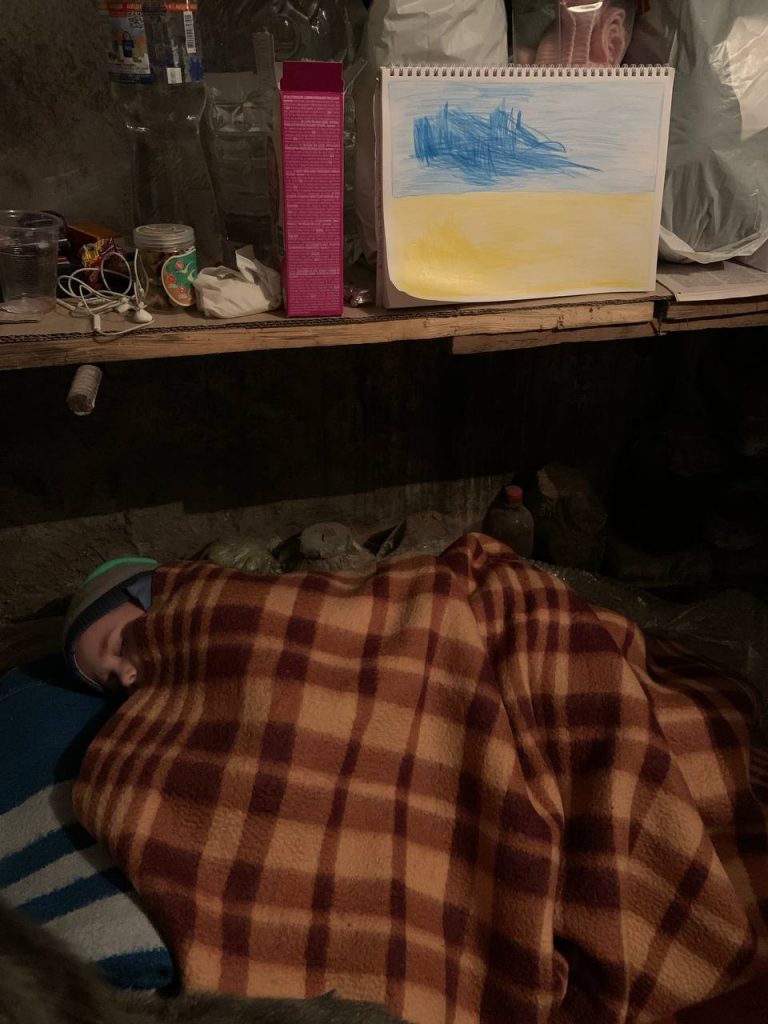
— What would you like to do in the first days after the peace is proclaimed?
— Tears welled up in my eyes from the question. Of course, I would meet my family that remains in Mariupol… Hug them, cry from the pain of everything that has accumulated during this time, cry from happiness that it is finally over. My grandmother dreams of raising the Ukrainian flag over the house after it’s over. We will definitely do that. We will rebuild everything. And we will definitely win.
Photos and videos provided by the heroine. She made them in the first days of the full-scale invasion.
Interviewed by Daria Rozhenkova





